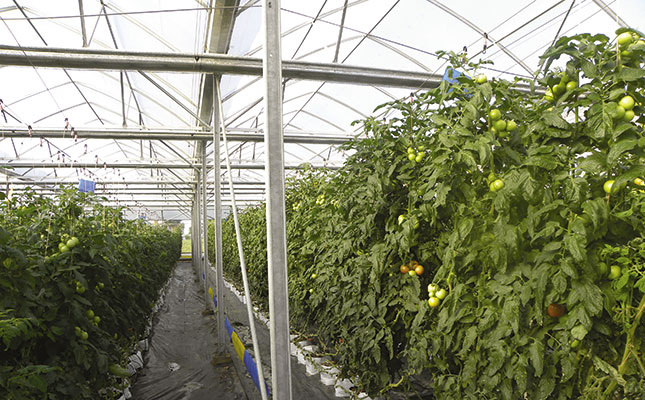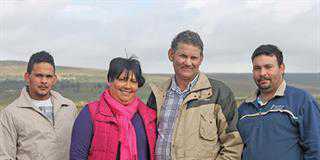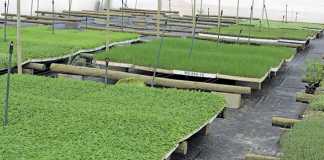
Photo: Robyn Joubert
Valley Fresh is a tomato producer in the Camperdown area of KZN, that is planting 10t to 12t tomatoes a month. Just like any other vegetable producer, it has had its share of ups and downs. But what sets Valley Fresh apart is that it is a social profit enterprise, with 100% of profit going towards sustaining hundreds of orphaned and abandoned children through sale from planting tomatoes.
READ: Tomatoes all year round
Valley Fresh was started by Lily of the Valley Christian Mercy Ministry, which operates the largest HIV/Aids children village in South Africa, providing homes to 152 abandoned or orphaned children. The children are accommodated in three villages, with one house mother to six children, and they get plenty of love and nutrition.
Two of the three villages are based on the same farm as Valley Fresh in Camperdown, while the third is in kwaNyuswa. Lily of the Valley also provides food and daycare to 210 children at other daycare centres, and to 11 community-based daycare centres, and operates the only community based clinic in the area.
Finances
“Our daily running expenses amount to R25 000/day,” says Valley Fresh CEO Ken Walton, who was formerly CEO at Lily of the Valley children’s village before Valley Fresh was spun off as a separate commercial entity in 2011. “To try and raise that amount of money through donations is a massive task.
“Our chairperson Noel Wright had a vision to buy this farm and use it to sustain our village, and to sustain these children. We continue to support them after school, until they have completed their training and can provide for themselves, in much the same way as a regular family supports their children.
“That is why Valley Fresh is run as a business. It must generate as much profit as possible.” The farm is 80ha with about 1ha under cover by way of one greenhouse and nine tunnels. “We started with two 8m x 30m poly tunnels in 2005,” recalls Ken.
“The first two tunnels were donated by the KZN Department of Agriculture as part of a community feeding programme.” In 2009, Valley Fresh changed its focus from growing food for its social outreach projects, to planting tomatoes to generate a profit.
“We added four more tunnels to see if we could generate an income. We learned very early on that to be viable with less than 10 tunnels is near impossible with current overhead expenses. You need economy of scale.”
Then in 2011, a generous R1,5 million donation from The Golder Trust for Orphans (funded by employees of Golder Associates worldwide) made it possible for Valley Fresh to buy a VegTech Shine Greenhouse, along with fertigation and rainwater capture systems and a pack house.
Planting tomatoes in the magic house
When planting tomatoes Valley Fresh uses a greenhouse which is locally manufactured by Vegtech SA, whose KZN agent is Filmflex Plastics. The length and width of the greenhouse is 36m x 38m, with a growing area of 1 354m2. This means the greenhouse is small enough to rely on natural airflow and does not need artificial cooling in summer nor heating in winter.
Side curtains and horizontal thermal screens are linked to an external weather station and temperature and humidity sensors within the greenhouse. These are automatically deployed to provide shading during the hottest time or to retain heat in winter.
The roof is designed with a ‘gothic arch’ which ensures maximum light transmission into the greenhouse and provides extra height and therefore a greater volume of air.
The galvanised steel frame is designed to withstand wind speeds of up to 150km/h. This is an important selling point for Valley Fresh as the greenhouse is located on a hill and exposed to heavy, gusting winds. “All this technology meant a higher initial investment but in the long term we have a superior house with minimal monthly running costs,” says Ken.
The size of the house is critical when planting tomatoes. “We have been through a very hot summer without cooling and have seen temperatures in the greenhouse of 7°C lower than in the tunnels. There are no hot spots which you get in larger greenhouses and there is uniform growth throughout the greenhouse.
We are producing 2kg more fruit per plant in the greenhouse and we predict a yield of 8kg/ plant for the current cycle – although we would like to increase yield to between 9kg and 10kg in the next cycle. The higher yield makes the greenhouse the most efficient option by far in the long term. It has made a huge difference to cash flow and profitability.”
Planting and pests
When planting tomatoes the planting density is the same in both tunnels and greenhouse, at 2,5 plants/m2 or 3 500 plants in the greenhouse. “We could plant at a higher density but our experience has been that yields are better at lower density and input costs are lower. Overcrowding can also create issues with ventilation and fungus such as botrytis.”
The greenhouse is covered with an ‘anti-vector’ greenhouse plastic imported from Israel, called Drip Lock 205, which blocks out the UV, a band of light up to 380 nanometres. This is the band of light waves that insects use for sight, so by blocking out this light, pests such as white fly, aphids and thrips cannot see their targeted crop once they enter the greenhouse. Once entering, these insects attempt to fly out again.
In Israel, trials with the drip lock plastic have showed that the grower can reduce the number of pesticide sprays from seven to two. This fits in well with Valley Fresh’s integrated pest management approach.
The farm prefers using biological products to reduce the use of harsh chemicals and pesticides, in preparation for its Global Gap audit and accreditation which is due within the next three months.
Selling point
Currently, tomatoes are washed and roughly graded on site. Thereafter, 90% of the crop is sent to FreshPict in Hammarsdale, 12km from the farm, for packaging and transporting to retailers. Of the remaining 10%, 5% is sent to municipal markets in Durban and Pietermaritzburg and 5% is retained for Lily of the Valley’s own use. The farm is in the final stages of constructing a 380m2 pack house.
Once the packhouse is up and running, Valley Fresh intends to launch a marketing campaign for its products. “Our vision is to market Valley Fresh as a social profit, fresh produce brand. The goal is to present a product to the consumer that is absolutely uncompromising in quality and taste but at the same time the consumer knows that 100% of the profit is used to support communities and children with HIV/Aids.”
The packhouse has a 60t/month capacity so it will be under-utilised at current production levels. But Valley Fresh has plans to build another 15 houses and to expand its product offering to winter cucumbers and Asian lettuce, depending on water supply.
It would also like to start an outgrowing model and look at some form of on-farm processing to create employment opportunities for the children and the greater community.
“Soli Deo Gloria (to God alone be the glory),” says Ken. “For 20 years, Lily of the Valley has been bringing the message of eternal hope to hundreds of orphans and communities ravaged by HIV/Aids. Now through Valley Fresh, this work can be sustained, providing hope and growing young lives to become sustainable,” he conlcudes.
Contact Ken Walton, Valley Fresh on 082 578 7937 or email [email protected]
Keith Hartley, Filmflex, 082 777 8540, or email [email protected]
This article was originally published in the 27 April 2012 issue of Farmers Weekly,













